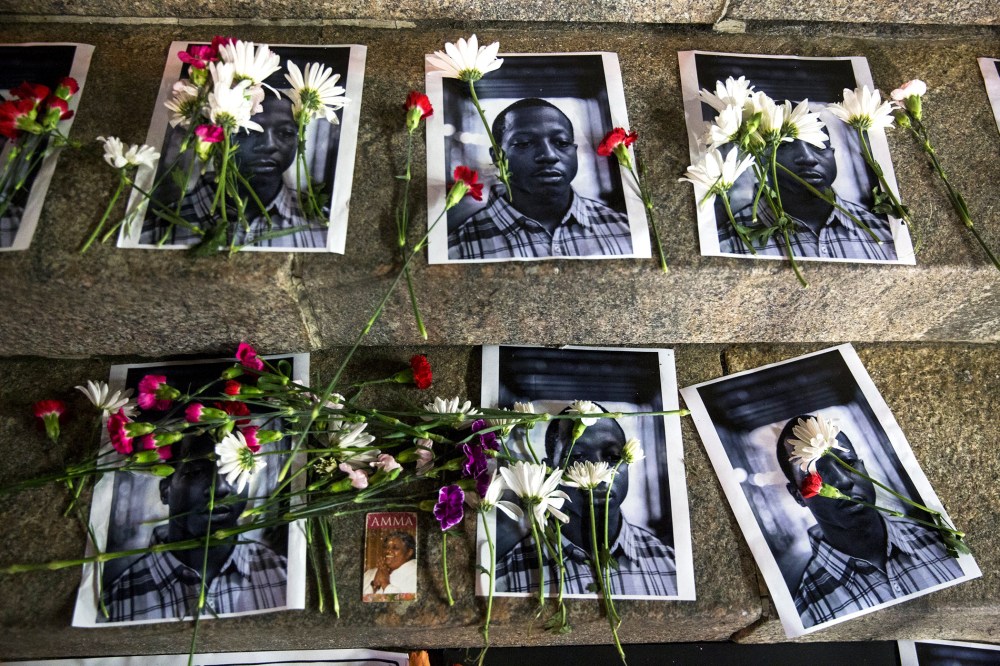NEW YORK — Activists and mourners gathered in front of the Metropolitan Detention Center in Lower Manhattan Thursday night to honor the memory of Kalief Browder and to rally support for a bill that could have kept the young man from the prison island where they lost him.
Browder was 16 years old when he was sent to Rikers. He was 20 by the time he left. For more than three years, Browder waited to be tried for the theft of a backpack, a charge he denied, and which the state lacked any compelling evidence to support. But before New York sent Browder home in June of 2013, it subjected him to all things cruel and unusual in American criminal justice. Guards and older inmates bruised his body, then solitary confinement went to work on his mind.
Browder spent his last two years on Earth struggling to return to his own life. He went to college. He went on talk shows, because, as Jennifer Gonnermen wrote in her obituary of the 22-year-old, Browder “wanted the public to know what he had gone through, so that nobody else would have to endure the same ordeals.”

Thursday night’s vigil came six days after Browder hanged himself in his Bronx home, and less than a week before the end of New York State’s legislative session. Among the bills still pending in Albany is a proposal to raise the state’s age of criminal responsibility to 18. If the proposal is enacted, the state will be prohibited from housing anyone younger than 18 in adult correctional facilities like Rikers. At present, New York and North Carolina are the only two states in the country that prosecute 16- and 17-year-olds as adults.
“Rikers wasn’t a place for Kalief,” said Carmen Perez, executive director of The Gathering for Justice, an organization dedicated to ending youth incarceration. “It’s not a place for the 10,000 teenagers currently residing in adult facilities across America.”
The crowd of mourners, holding flowers and signs reading “Raise the Age,” and “Indict the System,” shouted their agreement.
They are far from alone in seeing sense in Perez’s statement. The proposal to “raise the age” enjoys the support of many of the New York’s most prominent political figures, including Gov. Andrew Cuomo, New York City Mayor Bill de Blasio, the city’s Police Commissioner William Bratton, and the state’s Commissioner of Corrections Joseph Ponte.
In January, the Governor’s Commission on Youth, Public Safety, and Justice released a 164-page argument for raising the age of criminal responsibility and expanding pre-trial diversion programs for juvenile offenders.
The report put the plight of youths housed in adult jails at the center of its case, noting that adolescents placed in such facilities suffer increased risk of recidivism and suicide.
But the commission also justified its recommendations in purely pragmatic terms, arguing that by reducing recidivism, its proposals would actually improve public safety and reduce the justice system’s burden on taxpayers.
Connecticut is a model for such an outcome: After raising its age of criminal responsibility to 18 in 2012, the state saw a 16.5% drop in the rate of recidivism among 16- and 17-year-old arrestees, according to a 2014 report.
%E2%80%9CRikers%20wasn%E2%80%99t%20a%20place%20for%20Kalief.%20It%E2%80%99s%20not%20a%20place%20for%20the%2010%2C000%20teenagers%20currently%20residing%20in%20adult%20facilities%20across%20America.%E2%80%9D’
At the heart of the academic and political consensus for treating 16-year-olds as juveniles is the overwhelming evidence that the human brain doesn’t reach maturity until early adulthood. This fact has ethical implications for the treatment of youth offenders: it implies an essential unfairness in holding an adolescent with an underdeveloped frontal cortex to the same standard of responsibility as a fully developed adult. But it also has a practical implication for public safety: A mind still in development is a mind that can still be shaped.
The literature on applying rehabilitative models to adolescent offenders suggests the policy presents no trade-off between mercy and security, which goes a way towards explaining its near universal adoption.
But despite the virtually unanimous support for the policy among U.S. states and criminologists, Albany remains divided over the reform.
If 16- and 17-year-old defendants are re-classified as juveniles, their trials will be diverted away from criminal courts and into family ones. Several members of the State Senate’s Republican majority have expressed concerns over such a shift, arguing that it would stress an already overburdened family court system, while enabling truly dangerous individuals to re-offend.
RELATED: Rand Paul speaks on Kalief Browder
However, state Republicans have come out in support of transferring 16- and 17-year-old offenders away from adult facilities and into “hybrid” detention centers, venues that would feature some of the security elements of adult prisons, along with some of the rehabilitative services associated with juvenile homes.
“There’s a concern that, you’ve got individuals committing crimes, and victimizing law-abiding people in the community,” Republican State Senator Patrick Gallivan told msnbc. “But at the same time there’s a recognition that there’s a housing issue that we need to address with 16- and 17-year-olds. And a recognition that we can do a better job as a state to rehabilitate these kids.”

Gallivan said that Senate Republicans would also support giving district attorneys the authority to redirect certain 16- and 17-year-old misdemeanor defendants into the family court system.











